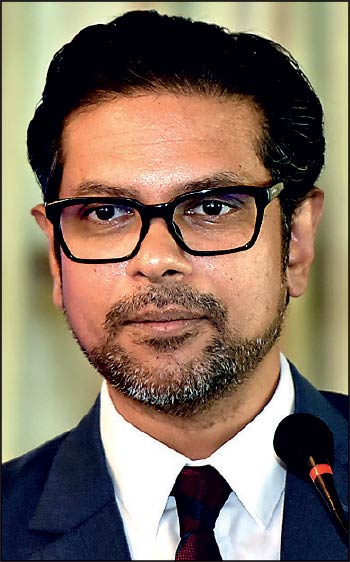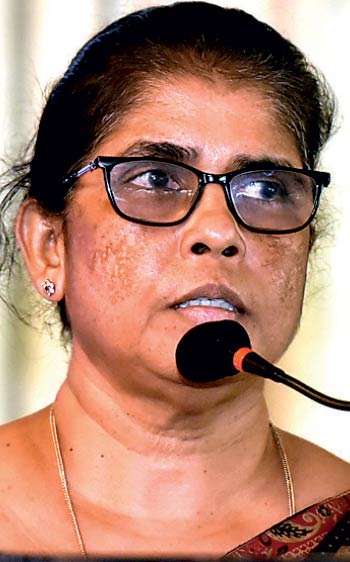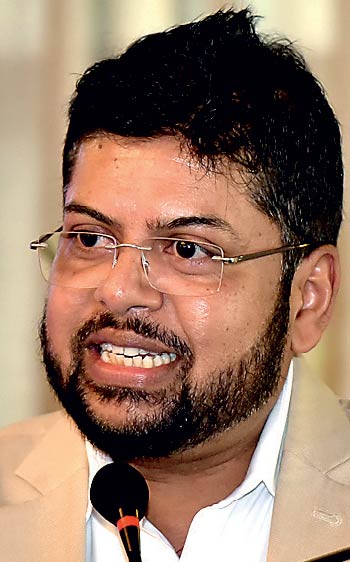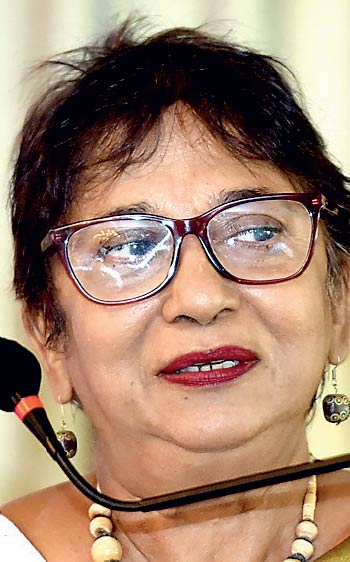Sunday Feb 22, 2026
Sunday Feb 22, 2026
Thursday, 6 November 2025 04:54 - - {{hitsCtrl.values.hits}}

The Asia Foundation Country Representative Johann Rebert

Women and Child Affairs Ministry Development Additional Secretary N.H.M.W.W. Herath

Canada High Commission to Sri Lanka and Maldives Development Officer Wipula Dahanayake

Women and Media Collective Programs Director Dr. Sepali Kottegoda
By Randima Attygalle
Marking the International Day of Care and Support on 29 October, The Asia Foundation and Women and Media Collective (WMC) with support from Global Affairs Canada, hosted the second National Convening on Recognising Unpaid Care Work in Lanka. The key highlight at the event was the launching of the report: ‘Why Reduce & Redistribute Unpaid Care Work? Findings from a Time Use Survey in Seven Districts in Sri Lanka.’
The report, drawing on research conducted by the WMC, provides a snapshot of women’s and men’s use of their time and labour engaging in direct care of others, indirect care of households and community care. It reiterates the urgent the need to recognise the value of unpaid care work as a critical component of the economy and to integrate reducing and redistributing unpaid care responsibilities into national policy frameworks. The report also highlights barriers to accessing reliable care services such as day care services, and examines perceptions of gender and the influence of gender norms on the distribution of care work within households, the state and the broader economy.
The report also tables recommendations to recognise, reduce and redistribute the disproportionate care responsibilities borne by women and girls and thereby enabling them to become proactive contributors to the national economy while promoting self-development.
Global numbers
An estimated 708 million women worldwide are outside the labour force because of unpaid care responsibilities, according to the ILO global estimates. The new estimates presented in the 2024 ILO statistical brief: ‘The impact of care responsibilities on women’s labour force participation’, are derived from data from 125 countries. They indicate that care responsibilities present the main barrier to women entering and staying in the labour force, while men are more likely to cite other personal reasons for being outside the labour force, such as education and health issues.
This stark gender discrepancy as ILO notes, highlights the disproportionate role that women take on in child-rearing, care, and support for persons with disabilities and those in need of long-term care, housekeeping, and other care responsibilities. Globally, around 1.6 billion women and 800 million men are outside the labour force, with 45% of these women and 5% of these men citing care responsibilities as the reason for their non-participation. Among women aged 25 to 54, the proportion citing care as the reason for being outside the workforce rises to two-thirds (379 million women). Women with lower education and those in rural areas also face higher barriers to workforce participation due to care responsibilities.
Beyond a women’s issue
Remarking that recognising and addressing unpaid care work is not just a women’s issue, but an economic, social, and development issue, Women and Child Affairs Ministry Additional Secretary (Development) Nilmini Herath went onto note that men and boys should be encouraged to make a fair share of unpaid care responsibilities. “This shift is critical to long-term change, and it is a big challenge we have to overcome and by confronting this challenge head-on, we can help build a more equitable, inclusive and prosperous society.”
Remarking that the Ministry of Women and Child Affairs’ policy direction emphasises addressing unpaid care work as a part of the country’s gender equality and women empowerment strategies, Herath further noted that following the launch of the National Policy on Gender Equality and Women’s Empowerment, the Ministry is now working to prepare the strategic action plan where an activity to reduce the burden of unpaid care work on women is included.
Improving policy and support services
Following the launch of the Time-use Survey Report, the WMC’s Director Programs, Dr. Sepali Kottegoda averred that it is important to recognise the simultaneous nature of unpaid care work activities, and acknowledge the multiple activities that are carried out most often by one individual for the wellbeing of household members. Noting that The Asia Foundation places a strong emphasis on promoting gender equality and women’s empowerment, its Country Representative, Johann Rebert said that addressing unpaid care work is as an integral part of this focus area. “Our project on Addressing Unpaid Care Work in Sri Lanka, looks to improve policy and support services to ensure that unpaid care work is reduced, recognised and redistributed.”
Forging strategic partnerships
Canada-funded ‘Addressing Unpaid Care Work in Sri Lanka project’ which is a four-year project, (2024-2028) implemented by The Asia Foundation together with WMC, advances Global Affairs Canada’s $ 100 million global commitment to addressing both paid and unpaid care. Delivering the remarks on behalf of Kiril Iordanov, Counsellor and Head of Cooperation High Commission of Canada to Sri Lanka and the Maldives, its Development Officer, Wipula Dahanayake said that the initiative also supports two strategic objectives of Canada’s Indo-Pacific strategy, investing in and connecting people and positioning Canada as an active and engaged partner in the Indo-Pacific region. “The unpaid care work too often goes unrecognised, yet remains the heartbeat of our society,” said Dahanayake adding that Canada remains steadfast in its commitment to advancing women’s rights as a central pillar of sustainable development. “Through strategic partnerships and targeted investments, Canada continues to promote inclusive growth, equitable participation, and social systems that value and support care work, reaffirming its role as a global leader in building a fairer and more just world for all. We believe this initiative will complement and thus broaden development efforts in Sri Lanka to reduce sexual and gender-based violence, promote human rights, support women’s economic empowerment, and strengthen women’s rights organisations,” he said.
As part of the convening, The Asia Foundation also featured a day care centre model for children, elders and persons with disabilities which is implemented by partner women’s organisations. A panel discussion was also held calling for a multisectoral approach to address the issue of unpaid care work in the country.
Pix by Ruwan Walpola